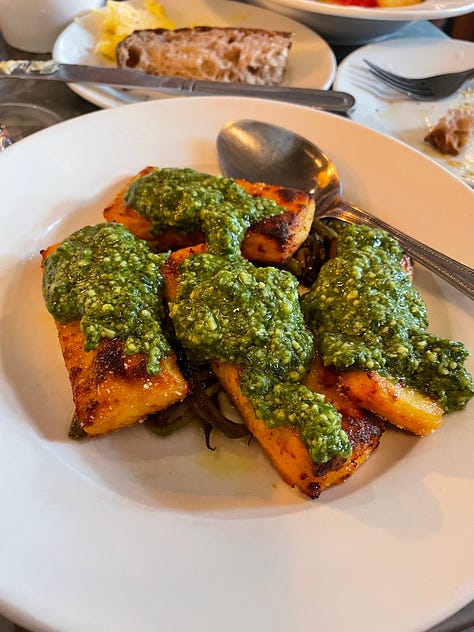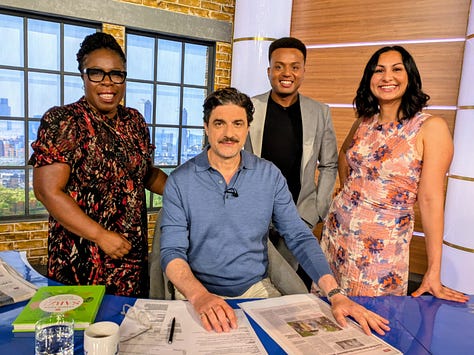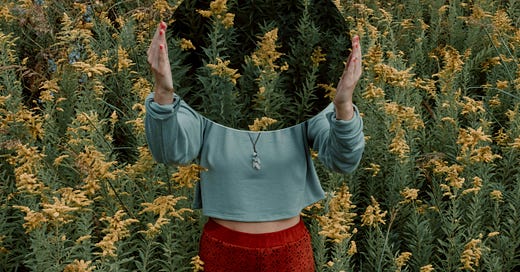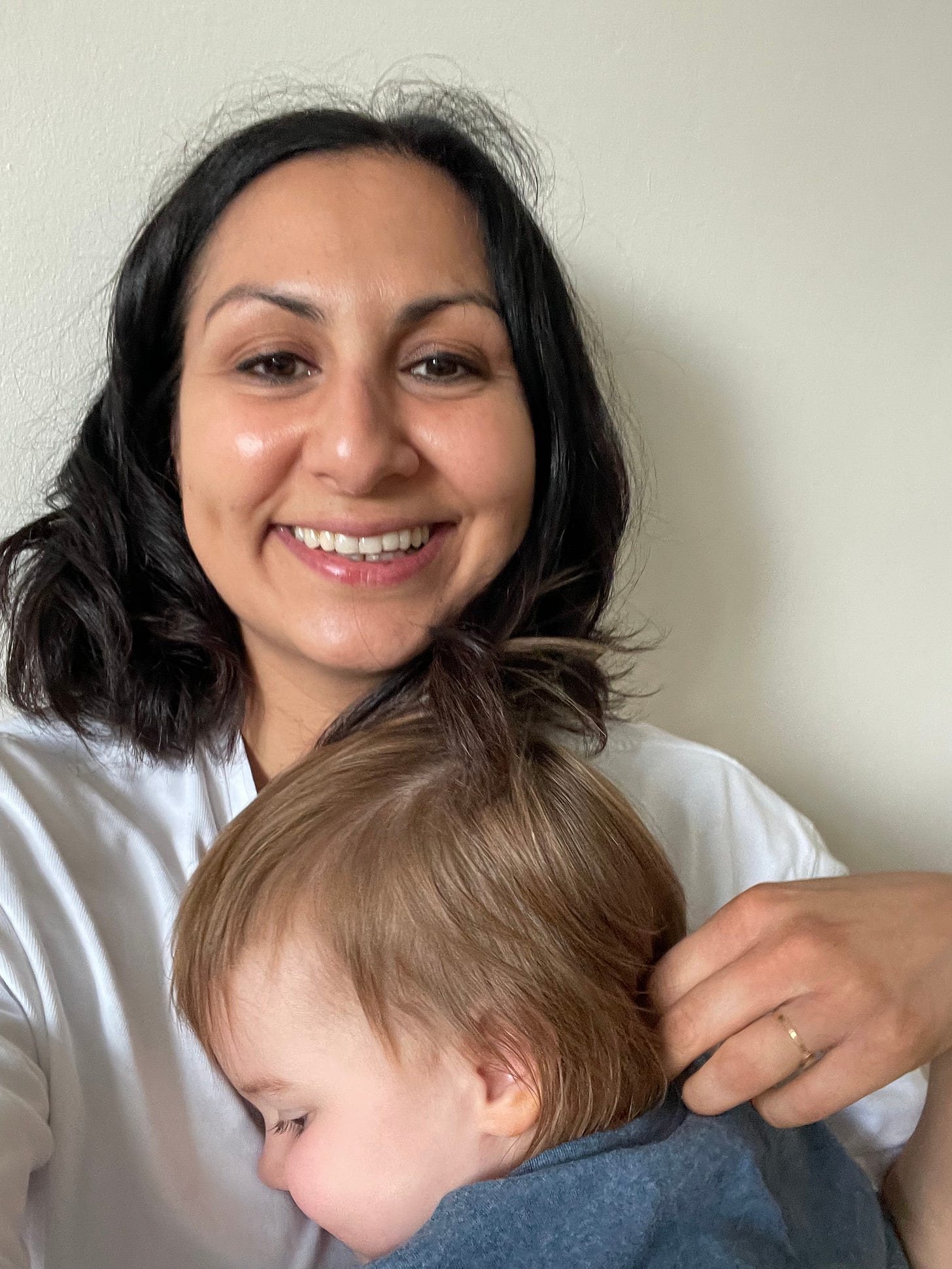What defines us?
A powerful new Netflix documentary and the challenge of carrying multiple identities
It’s been quite the whirlwind week.
My new book Sabzi: Fresh Vegetarian Recipes for Everyday was published last Thursday (thanks to all have bought a copy!) and it’s been a joyful occasion with a flurry of media interviews, lots of positive press and a lovely dinner at my neighbourhood restaurant Jolene in Newington Green to celebrate on publication day. I’m off on my UK book tour this week, so if you fancy some conversations about food, the Middle East, motherhood and social change – please come join me!



At the same time, a powerful new Netflix documentary, Attack on London: Hunting the 7/7, was released last week, exploring the impact and legacy of the London bombings 20 years on. I contributed significantly to the film, speaking about the rise in Islamophobia that followed the attacks, and the shock, tragedy, and police impunity surrounding the killing of the innocent Jean Charles de Menezes.
The series is streaming globally, and I’ve been doing various media interviews to promote it, including a really thoughtful conversation on The News Agents podcast with Emily Maitlis and Jon Sopel yesterday, where we discussed whether the police in the UK have changed or learned anything since those tragic events and where we are now as a society, amidst deepening divisions and increasingly inflammatory rhetoric from politicians. (I’m on at 39 minutes in, do have a listen.)
On top of this, I’ve been working with a small group of food industry professionals to launch a new Gaza solidarity initiative in the UK, an issue that many of you will know is very close to my heart. Palestine, in many ways, has defined much of my political and humanitarian activism over the last 25 years so to see a protest group like Palestine Action proscribed as a terrorist organisation in the UK last week has been shocking. I highly recommend reading this feature by acclaimed journalist George Monbiot, which explains why banning the group is so contentious. While speaking on a TV panel to promote Sabzi last week, I couldn’t help but raise these wider issues around Gaza that I grapple with every day, still unable to comprehend how a genocide is allowed to continue.
And of course, my main job this week has also been being a mum, a role that continues to bring me deep joy and moments of respite from the horrors in the news. Even if my daughter decided to wake up nearly every hour on both weekend nights, leaving me and my partner more exhausted than ever by Monday morning 😵💫
I’ve been going back and forth with my US publishers this week, trying to plan a book tour for September that works around caring for a one-year-old and doesn’t completely wipe me out. Turns out, that’s quite hard to do and yet again, I’ve been reminded of the professional and economic price new parents pay because of the way our society structures care and work.
Like I said, it’s been quite the week.
In the midst of all this – the press, the panels, the protests, the parenting – I’ve been sitting with a quieter question too. One that’s hard to articulate but has been growing louder lately: what does it mean to be your full self in public? And is that even possible when the world so often asks us to be just one thing?
As someone who wears many hats – writer, activist, mother, cook, citizen – I often feel I’m expected to choose which one to present depending on the context. When I'm talking about what’s happening in Iran, I’m not meant to be joyful. When I’m talking about food, I’m not supposed to be political. When I speak about motherhood, there’s little room for anger or dissent. But that’s not how real life works.
Part of this stems from who I am. I’m half Iranian, half Pakistani, and was born in the UK so I’ve always carried multiple identities, often feeling like I didn’t fully belong anywhere. That experience has shaped how I see the world, how I write, and how I move through public spaces. But it also means I’m often seen through a lens of otherness, expected to simplify myself to be more legible to others.
The media thrives on neat categories: the ‘cookbook author,’ the ‘Muslim voice,’ the ‘campaigner.’ It makes it easier to sell a story, maybe. But it flattens the truth of who we are and leaves little room for contradiction, grief, pleasure, rage, joy. And I think that’s a loss, not just for those of us in the spotlight, but for the collective story of what it means to be human.
I’ve been thinking lately that one of the more important things we can do in life is show up as a whole people, refusing to be flattened, refusing to perform simplicity. It’s something I’ve struggled with in my career over the past 10 years as one of the hardest things about trying to make a living at the intersection of food and politics is often feeling that you are not being fully accepted in either. I’ve felt dismissed as a food writer (in the UK, not the USA interestingly!) because I talk about injustice and war. And I’ve felt overlooked or undermined as a political commentator because I also write about saffron and sabzi. As if one disqualifies the other. As if care and rage, pleasure and protest, can’t exist in the same person. But they do. And they always have.
A few years ago, I pitched a book – part memoir, part social analysis – exploring how we cultivate resilience during personal and political crises. I wanted to write about what I’d learned from my fertility struggles and disastrous dating history, from having a life changing burnout at 30 and changing careers, from conversations farmers at the front line of settler violence in the West Bank, and from the deep power of community I witnessed while co-ordinating the Menezes campaign. The proposal was rejected by many publishers and of course, I take responsibility for that, I guess it just wasn’t strong enough. But I also know from the feedback I received that part of the reason it got rejected was because it didn’t fit neatly into a box.
Almost every editor replied with a polite and warm email saying they loved my writing, but as I was already known as a successful cookbook author, it would be hard to position me as someone writing on these more political themes. It was so infuriating as of course, I’ve been a political campaigner for so much longer than I have been writing recipes but it was representative of how traditional publishing likes to pigeon hole writers.
So this week, I’m holding space for multiplicity and the parts of ourselves that don’t always fit into a soundbite. I’m curious to know, what are yours?
And I’m grateful to you for being part of this Substack community that makes space for the messy, contradictory, glorious fullness of my life. Here’s to carrying multiple identities and seeing that as a strength, not a weakness.
Have a great week
Yasmin x










Thank you Yasmin joon for sharing this. It is infuriating to be put in a box, specially if you're a person of colour, more particularly if you come from the middle east, you're expected to never speak of joy, and whatever you do is always "tainted" with your background. And if you do talk about politics it often falls into the abyss of the endless political talk about the Middle East that people think is just something omnipresent.
I can't wait to order your new cookbook (is it available for pre-order yet in the US?)! And yes, society's tendency to tell us that we can only be one thing or the other is frustrating beyond measure. Because after all we contain multitudes, in the words of Whitman.